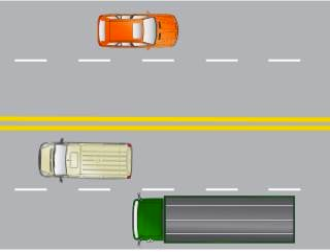Explanation:
Use the four-second rule since stopping distances can double on icy and wet roadways. Your stopping distance will also increase due to the trailer's additional weight. In fact, it may take you 6–8 seconds to halt if the surface is frosty to icy.
Explanation:
To achieve the best traffic flow, drive in the left lane unless you are overtaking another car.
Explanation:
Your vehicle would become risky to drive if you have to use the spare tire due to a puncture.
Explanation:
Other drivers will be aware of your intentions after three seconds of signaling.
Explanation:
By remaining stopped, the fire truck will be able to negotiate its way past you, reducing the risk of a collision.

Explanation:
A multi-lane road is one that has more than one lane going in each direction.
Explanation:
When a car enters the junction after the lights have turned red, the camera is triggered.
Explanation:
You must not overtake a car on the left if it is signaling to turn left since there is a chance it will turn into your path.
Explanation:
P1 and P2 drivers do not have sufficient driving experience. You must be at least 17 years old, have recorded at least 120 hours of driving time (including at least 20 hours at night), and have held your P1 license for at least 12 months to take the driving test for a P1 license. To advance to your P2 license, you must have held a P1 license for at least 12 months before taking the Hazard Perception Test. Before a full license can be given, a P2 license must be kept for at least 24 months.
Explanation:
You can overtake on the left if it is safe to do so and your vehicle will fit through the space if a vehicle is indicating right and has moved over to the right of their lane, is in another lane, or is in a turning bay.
Explanation:
You must be able to see at least 100 metres ahead of you after passing to give yourself ample time to react to unexpected circumstances.
Explanation:
Give way to vehicles headed your way in accordance with the Give Way regulations. You must already be in the junction before you move into it and wait for approaching traffic to halt for a yellow or red light before turning on the red light.
Explanation:
A car can only emit smoke for ten seconds at most. Even if it lasts less than 10 seconds, smoke produced by tires due to loss of traction may be viewed as a different offense.
Explanation:
Trying to enter into freeway traffic too slowly puts other vehicles in a dangerous situation where they may have to brake hard. Match your speed and merge into a lane that isn't congested. Stopping at the end of the merging lane is particularly risky because you could be traveling at speeds of up to 100 km/h slower than other traffic, making merging exceedingly dangerous for you and other vehicles.
Explanation:
You drive in the lane. A verge is a road's grassy edge. On a walkway, people move about. A raised concrete or stone kerb may be present along the road's side. Lines are used to identify roads. Between kerbs, verges, painted lines, a kerb and a painted line, or a verge and a painted line, lanes are formed.
Explanation:
Make it a practice to use your indicator every time you make a maneuver so that other drivers are aware of your intentions.
Explanation:
Even if there is an emergency lane, stopping on a motorway is riskier. There is unlikely to be anywhere you can address these issues, and if you have a preventable issue with your vehicle, you will create an unnecessary hazard. Because freeway speeds are high, having the proper tire pressure is critical. Incorrect tire pressure can impact handling and increase the chance of a tire blowout.
Explanation:
If your license plate is obscured by a bike rack or towbar, you must make appropriate preparations to see the plates properly.
Explanation:
In a fog, you can turn on all of your lights, but avoid using your full beam headlights because they can bounce back at you and make it harder for you to see. Do not raise your headlights. When the fog lifts, turn off your fog lights so as not to blind other drivers.
Explanation:
Utilizing your lights will increase your vehicle's visibility to other road users in all of these scenarios. It should be noted that even in situations when visibility is excellent, you must turn on your headlights or daytime running lights when riding a motorcycle made after January 1, 1980.